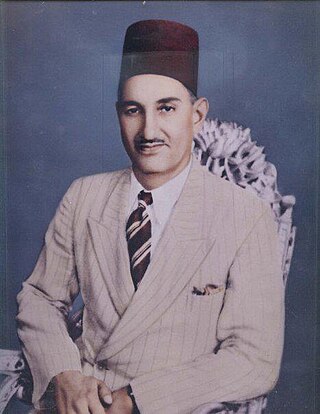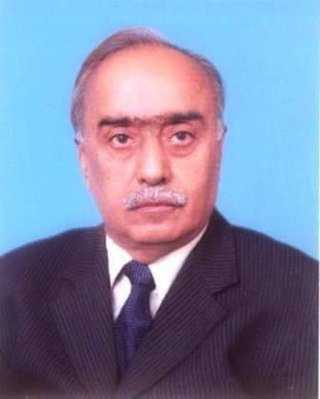Related Research Articles
Pakistan’s tradition of poetry includes Urdu poetry, English poetry, Sindhi poetry, Pashto poetry, Punjabi poetry, Saraiki poetry, Baluchi poetry, and Kashmiri poetry. Sufi poetry has a strong tradition in Pakistan and the poetry of popular Sufi poets is often recited and sung.

Shaikh Ayaz SI born Mubarak Ali Shaikh was a Sindhi language poet, prose writer and former vice-chancellor of University of Sindh. He is counted as one of the prominent and great Sindhi poet of Pakistan in general and Sindh in particular. He authored more than 50 books on poetry, biographies, plays and short stories in both Sindhi and Urdu languages. His translations of Shah Jo Risalo, which was written by the 18th-century Sufi poet Shah Abdul Latif Bhittai, from Sindhi to Urdu language established him as an authority in his domain.
Talib Jauhari was a Pakistani Islamic scholar, poet, historian and philosopher of the Shia Sect of Islam. He is widely renowned as the most prominent Shia scholar, and his sermons were broadcast on PTV Network.

Pir Ilahi Bux or Pir Ilahi Buksh was a Pakistani politician and activist who was a prominent member of the Pakistan Movement and who served as the Chief Minister of Sindh from 1948 to 1949.
Sindhi literature is the collection of oral and written literature in the Sindhi language in prose and poetry. The Sindhi language of the province of Sindh in Pakistan is considered one of the oldest languages of ancient India, and influenced the language of Indus Valley inhabitants. Sindhi literature has developed over a thousand years.
Nabi Bakhsh Khan Baloch was a Sindhi research scholar, historian, sindhologist, educationist, linguist and writer. He predominantly wrote in Sindhi, but also in Urdu, English, Persian and Arabic. He has been described as the "moving library" of the Pakistani province of Sindh.

Rasool Bux Palijo was a Pakistani leftist, Marxist leader, scholar and write. He was a leading human-rights lawyer and the leader and founder of Awami Tahreek, a progressive and leftist party.
Dr Fahmida Hussain is a Sindhi author, scholar, linguist and intellectual.
Imdad Hussaini was a Pakistani Sindhi poet and an Urdu language writer.
Dr. Abdul Jabbar Junejo was a Sindhi writer, poet, novelist, story-writer, critic, linguist, historian and musicologist of Sindh, Pakistan.

Sibghatullah Shah Rashdi III, also known as Raja Saein, the eighth Pir of Pagaro, is a Pakistani politician who has served as a member of Provincial Assembly of Sindh.
Ahmad Khan Madhosh was a famous poet of Sindhi language.
Ustad Manzoor Ali Khan was a Pakistani singer belonging to the Gwalior gharana singing style, one of the oldest singing traditions in Hindustani classical music. Born in Shikarpur, Sindh, Pakistan, he was the first classical musician of the twentieth century who knew about the regional music of Sindh.
Gul Muhammad Khatri (1919–1979) was a renowned artist, painter and writer living in Karachi, Pakistan. He produced art works in the form of portraits, landscape art, and calligraphic illustrations of Sufi poetry. He also did commercial art work in the form of poster design, glass painting, sign board, textile design, theatrical design, cinema posters, tile design as well as Sindhi, Urdu, Hindi, Gujarati and English calligraphy.
Abdul Qadir Junejo was a novelist, playwright and columnist who wrote in Sindhi, Urdu and English.
Ali Gul Sangi was a poet, author, political activist, and journalist of Sindh, Pakistan. His Urdu and Sindhi poetry was sung by a number of singers including Mehnaz, Ustad Muhammad Yousuf, Manzoor Sakhrani and others.
Atta Muhammad Bhanbhro also spelled as Atta Mohammad Bhambhro was a Pakistani writer, translator, poet, historian, lawyer, and the founder of Hoshu, a banned rebellious magazine. He wrote more than four hundred books on Sindhi literature, history including translations and civilization besides contributing to indus script through his writings. He was a wide studied man who claimed to read indus script found in moen jo daro but his research was not completed by him due to poority and government's little attention. Sometimes, he is referred to as archaeologist for his archaeological contribution excavated in Sindh.
Kamal Jamro was a professor, writer, educationist, researcher and poet. He had written various books on Sindhi literature.

Syed Hayat Ali Shah Bukhari was a Pakistani radio, TV and film artist, dramatist and film director. He wrote more than 200 serials and plays for radio and TV channels. He also served as a journalist and columnist. He was associated with the Sindhi-language DailyIbrat at the time of his death in 2020.
Noor Muhammad Lashari was a stage, radio, TV and film actor from Sindh, Pakistan. He was awarded the Pride of Performance Award in 1992 by the Government of Pakistan.
References
- 1 2 3 4 Khaskheli, Jan, id=151776 "Tajal Bewas passes away", The News, 14 December 2008, retrieved same day.
- ↑ "تاجل بيوس : (Sindhianaسنڌيانا)". www.encyclopediasindhiana.org. Retrieved 16 March 2024.
- 1 2 No byline, "Tajal Bewas dies at 70", article, The Nation, 15 December 2008, retrieved 14 December 2008.
- 1 2 Turk, Niaz, "Renowned Sindhi poet Tajal Bewas passes away", The Regional Times, 14 December 2008, retrieved same day.
- ↑ "Tajal Bewas passes away," The News International, 14 December 2008.
